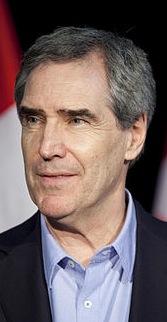Other than their wounded pride — and, as we all should know by now, pride goeth before destruction — it’s hard to see why so many Canadian Liberals are complaining so vociferously about the Conservative majority that resulted from the May 2 federal election.
After all, notwithstanding the L-Shaped Party’s longstanding habit of campaigning as if it were the NDP, it has long governed as if it were the Tories, and more recently as if it were the so-called Conservatives of Prime Minister Stephen Harper’s Conservative-Reform-Alliance Party coalition.
So, aside from some charmingly progressive rhetoric at election time and a looser interpretation of the need for its MPs to stick to the party’s official talking points, it’s fair to ask what Liberal supporters are missing under Stephen Harper that wouldn’t have been provided by Paul Martin.
Cuts to social programs? Concentration of wealth? Six of one; half a dozen of the other! Or, more to the point, 167 of one (Harper in 2011); 168 of the other (Martin in 2004).
Yes, ordinary Canadians have cause to be gravely worried about what Prime Minister Harper will likely get up to now that he has a comfortable majority, notwithstanding his gentle-sounding day-after rhetoric. But, really people, is it all that different than what we could have expected from Michael Ignatieff with a similar Liberal majority?
Look, we’re all in agreement here: Ignatieff seems like a much nicer fellow than Harper, even if he did suffer from the common Harvard PhD’s delusion that the rest of us were hanging on his every word just because his students used to take notes.
And we can agree that some of his election platform policies sounded pretty progressive — but then, so did Martin’s promise of a national child-care program. And where did that one go? Other than the place all progressive sounding Liberal promises seem to go, that is — Zap! You’re frozen!
But when you get right down to where the rubber hits the road, there is no substantive difference between the policies the Conservatives now offer and those the late lamented Liberals would have been likely to deliver in the same circumstances.
Indeed, it may be the similarities, rather than the differences, that explain the prime minister’s irrational hatred for Ignatieff and Liberals, and his seemingly warmer feelings for Jack Layton and the NDP.
It is said here that a big part of the explanation for the Orange Wave that saw Canadians choose the New Democratic Party as the Official Opposition is that they wanted an opposition that actually opposes what the Harper government is likely to do. The only puzzling thing about this “shocking” development is that we Canadians took so long to get to it.
As re-elected Conservative Edmonton-Centre MP Laurie Hawn, getting it mostly right for once, put it in the wake of Monday’s election: “Canadians now have a clear choice, something that is right of centre and something clearly the left of centre.”
He exaggerates, of course, how far to the left the NDP under Layton really is, but we can almost forgive him that hyperbole under the circumstances. Because it is true, arguably for the first time since Confederation, that the Parliament of Canada now has an Opposition party that is in fact to the left of the governing party.
As frustrating as the next four years may be for progressive Canadians, who constitute the majority of citizens, in the long term that can only be a good thing.
The professional media and the political commentariat, steeped in generations of Liberal dominance, can barely come to terms with the notion that in Canada, just like the rest of the post-industrial West, the era of right-wing Liberal parties is almost as far gone as the age of Whiggery.
Come to think of it, the Whigs may have had a good idea or two — Down with the King! — but as a political movement they’re deader than the proverbial mackerel, just as the Liberals are today nothing more than a dead mackerel swimming.
Yet, steeped in the habits and delusions of the past, all the Canadian media can focus on is who the Liberals will choose to replace the hapless Ignatieff and how the party will reinvent itself.
Well, here’s a bulletin: the Liberals are not going to reinvent themselves, even with someone named Trudeau in the vanguard. They are done like dinner, thanks to Ignatieff’s incomprehensible campaign and the forces of history. They’ll no more recover from this blow than did the Progressive Conservatives, who notwithstanding the current governing party’s name were finished off by the combined efforts of Brian Mulroney, Preston Manning and Stephen Harper.
Ludicrously, professional pundits keep talking about how the NDP stole the progressive vote from the Liberals, as if the Liberals deserved it, allowing the Conservatives to triumph. In fact, it was the Liberals in their traditional campaign camouflage of mock progressives that did the vote splitting.
More sensibly, some Liberals — like former Ontario NDP premier Bob Rae — are talking about the need to merge with the NDP. But no one should imagine that such a merger could be on anyone’s terms but the NDP’s.
Indeed, the effects of vote splitting in 2011 notwithstanding, it is hardly necessary, since the Liberals are likely to wither away all on their own without help. Certainly, there will be no need for a hostile reverse takeover by the NDP like that the Reform Party used to permanently hijack the Progressive Conservatives.
So don’t cry for me, Argentina — even if we Canadian have to live like Argentines for a while… The future belongs to the NDP!
This post also appears on David Climenhaga’s blog, Alberta Diary.



